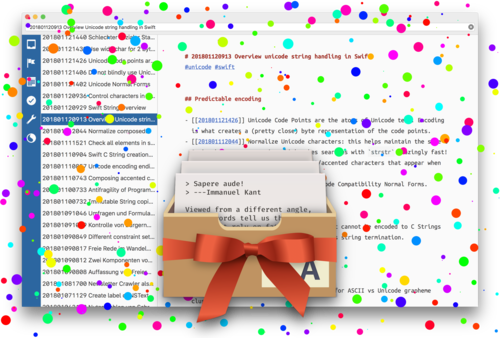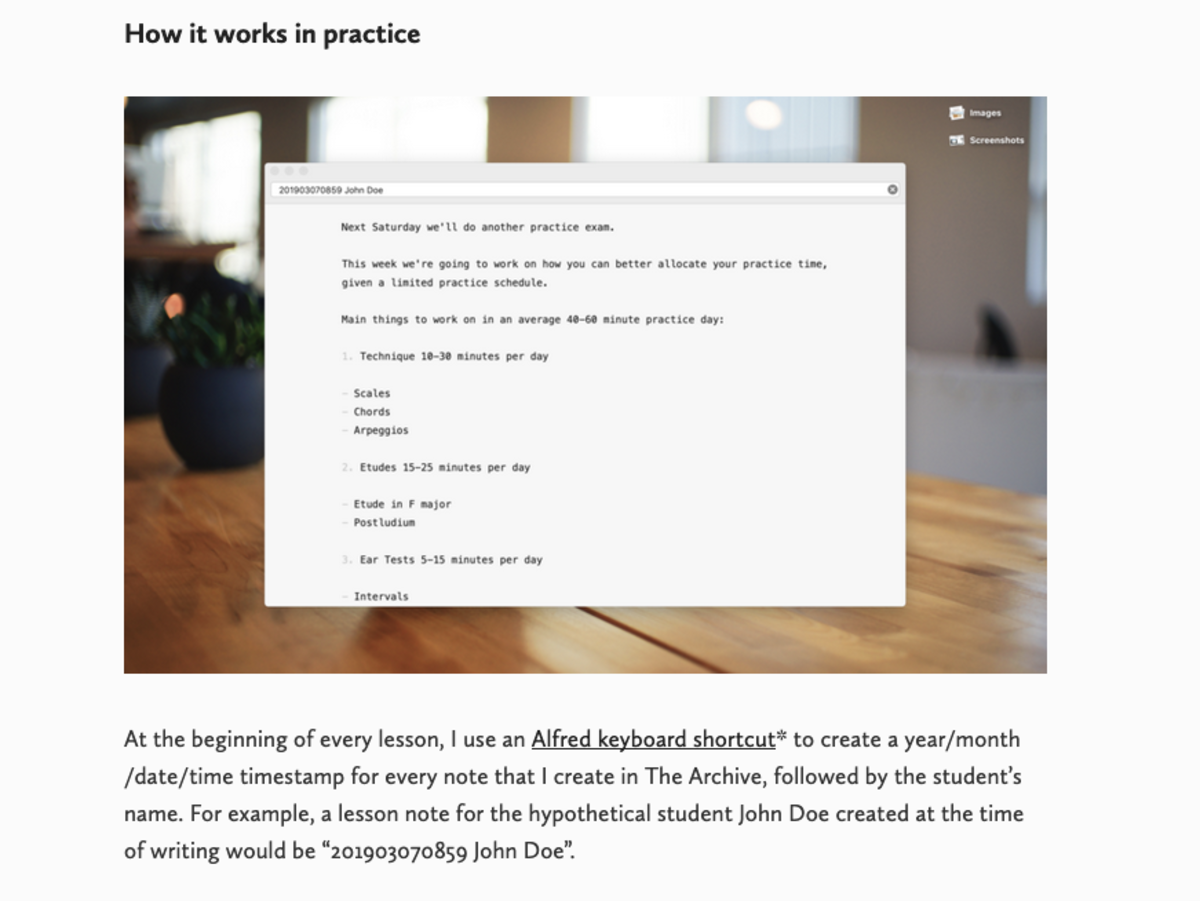Posts from 2019
Beginnings of Bryan Kam's Zettelkasten Journey
Bryan Kam wrote two posts about his embarking on a Zettelkasten journey in recent months. Especially if you’re getting started, posts like his can be a nice place to get inspiration and a feel for the early days. In his first post, he talks about his understanding of the method as a “methodology for thinking in writing.” Which is a pretty apt summary of one of its benefits already. He also draws connections to Getting Things Done, which I’d argue the Zettelkasten Method is not an alternative, but an extension of for personal productivity. Either way, Bryan lists a few core principles and their immediate, actionable results. For example this:
"Thinking Outside Experience" - David Epstein: "Range" - Book Processing Ep 06
This chapter’s outline started out was pretty short – and most of the stuff that I did add was anecdotes and stories. Interesting stories, sure, but nevertheless not much to brag about in front of your friends who study humanities. The actual sources will be interesting, but I didn’t get to them this time.
"Learning, Fast and Slow" - David Epstein: "Range" - Book Processing Ep 05
By accident, I started this episode with an outline that was surprisingly long and lended itself well to my favorite Zettel refactoring, called “Extract Zettel”, where I take part of an existing note and put it into a new one, leaving a link in place of the cutout. Took me 3 weeks to get into the groove, and since last time things flow quite smoothly as I hunt for precious information in this journalist’s take on a complex topic.
David Epstein: "Range" - Book Processing Ep 04
This episode is shorter, because I didn’t find many useful ideas in Chapter 3. And the ideas I did find interesting were not citable, so I had to look the originals up. That took most of the time, but did ultimately not produce many new notes. I did add a couple, though, and in the last 5 minutes extracted a few notes from a comment I left behind that also affected the previous chapter’s outline.
David Epstein: "Range" - Book Processing Ep 03
Please enjoy episode 3, hitting early this week because I’ll be traveling for a couple of days – and cannot muster the strength to wait until Friday to hit the “publish” button. This chapter was harder to process. There seemed to be parts missing in the story. Maybe I’m too sloppy and haven’t noticed the missing pieces? Either way, something’s amiss in Range land. I also notice that the topics from chapter 1 were connected to the topics here somehow, but it’s just a hunch how things will fit together eventually. I’m looking forward to the next episodes, because I hope it “clicks” and I know how to split the sequence of notes in the structure note up into new Zettel notes and then work with the more powerful web of notes instead of this monolithic book overview.
David Epstein: "Range" - Book Processing Ep 02
Here’s episode 2 for y’all! Everything was a ton easier this time. In the previous episode, I processed the classic study by Ericsson et al on deliberate practice. That was by far the hardest nut to crack, and on top everything was recorded. That took a noticeable amount of cognitive capacity, too. And the studies I wanted to have a closer look at were either not available in full-text or irrelevant in detail, so I could focus more on the actual connection-making and writing. (The part I actually like, heh.)
David Epstein: "Range" - Book Processing Ep 01
The episode is live! Please comment in the forums; we’d like to know what you think of the format. Sascha’s discussion starter, repeated here so you know the context when you comment below: We are very curious about your opinion. We don’t do bias your comment with specific question. So we ask in general: What are your thoughts about this format?
Some Q&A on the Zettelkasten Method and Student Life

@diogenes, a student of philosophy, psychology and history in Vienna, asked some questions on the forum. I’d like to elaborate a bit on that. There will be specific use cases for the Zettelkasten Method. The method itself is a meta method of knowledge work. It translates what we understand of knowledge acquisition into basic actions that can be incorporated into any (knowledge work) workflow. Here, I will show a couple of applications to a more specific case.
The Zettelkasten as a Lattice of Thought Strings

Please welcome Gerrit Scholle, aka gescho from the forums! Gerrit kindly took the time to write up his recent thoughts as a self-contained blog post, with colored pencil drawings and all! Enjoy. A recent forum post led me to an idea that seemed to be brewing in my subconscious for a little while.
Trust the Process
This is a recent highlight from the forums. Nick Milo posted this the other day; we’d like to feature his essay on the blog so you don’t miss it. The following is a verbatim copy of his forum post, plus a link to @daneb’s post that @nickmilo22 added for context.
The Archive (v1.4) Introduces Multi-Tabbing
We’d like to introduce to you the latest update to The Archive. It comes with multiple tabs and windows! You can now search for different things in different windows without losing the context of your previous work. Multiple windows were an oft-requested feature since the early beta. The benefit is obvious: you can write a note, then search for a note to link to in a new tab without losing the context of the note you were writing.
The Archive (v1.3.0) Browser Navigation

We’re proud to announce the latest big update to The Archive! It adds browser-like navigation, so you can get back to the results of an old search quickly. This will be super useful in your workflow, especially when you often get lost in a rabbit hole. When you’re done following links, hit the back button to get to your starting point. No need to remember what exactly you did search for; no need to keep note IDs in the clipboard to get back to the start.
Breadcrumbs in Your Archive
Here’s today’s fun story. Sascha asks me if I remember the connection between an author (Heinrich von Kleist) and a concept (Maieutics). I hesitate a bit but then agree: yes, it’s his concept. The association feels just so familiar. I look up the concept in my archive, searching for “midwifery” (“Hebammenkunst” is the German term Sascha suggested). I indeed stumble upon a note about a text by Heinrich von Kleist about the spontaneous and sequential creation of thoughts during conversation.
Three Layers of Evidence

In a Zettelkasten – if done correctly – there will emerge layers of evidence. These layers represent the necessary processing steps from data to knowledge. It is very rare that raw data is put into the archive. You can do it. But normally, you will process the data outside your archive. So I will ignore this possibility. The three layers are:
Zettelkasten and Personal Knowledge Management for Business Founders
André Chaperon got in touch and told us how much he loves The Archive and the Zettelkasten Method – and then went on to summarize the gist of the method and app usage for his fellowship of small business owners. His process includes paper-based notes, which are taken in a leisurely manner, meant to be thrown away later manner, and ends with Tinderbox-based visualizations to get an overview. With all the “Getting Started” links and helpful details, this is a great resource to get started. Read “How to create Idea Babies: A Knowledge Processing System for Marketers, Creators, and Knowledge Workers”.
Sascha’s Comment: Use cases are very interesting. If you think about them they can give you great insights into the method of creative knowledge work, especially if the particular use case is not from your field of expertise. As a scientist you can learn a lot from a small business owner. The similarities allow you to extract general rules of creative knowledge work.
Christian’s Comment: André’s post could be the starting point you’ve been missing on this very website for so long. His summary of the Zettelkasten Method is spot-on. I really like that he presents a full slice of a piece of work, from summarization on paper to notes because that makes it so much more valuable. (I may be biased after André opened the conversation with a declaration of his love for The Archive. Full disclosure: I’m the developer of said app :))
The Archive Turns 1 Year Old!

This day a year ago, The Archive became publicly available for sale! To celebrate, we chopped 50% off of the regular price for 5 days. You can now also purchase a license for a friend, colleague, family member, or your favorite pet by using the new Gift Purchase option in our store.
Using The Archive to Teach Music

Dr. Christopher Foley is a piano teacher based in Toronto, Canada. He set up The Archive to write, send, and curate lesson notes for his piano students. Read “How I Use The Archive and My Music Staff to Create Engaging Lesson Notes”.
Christian’s Comment: I’m familiar with programming and the humanities, but I always wondered how a Zettelkasten could work for fine arts – or music, for that matter. I’m looking forward to hear progress reports by Dr. Foley that go into detail!
Sascha’s Comment: I think that shows the power of a plain text approach. Basically, all you need to do is to manipulate text. That means that you should set up a system that makes your manipulation abilities so powerful that the bottleneck in your workflow is not determined by your fingers but by your thinking. Great work, Doc. :)
iA Writer as a Zettelkasten Note Archive
Lorenzo wrote an article about how to use iA Writer for macOS as your Zettelkasten note archive. Apparently, iA Writer has a sufficiently quick search for large archives (10,000 notes big, in fact), which surprises me.
As a native macOS app, you can use iA Writer to sync with Dropbox, iCloud, and other folder-based sync services and either use their mobile or Windows counterparts, or whatever else you like. No boxing-in.
Have a look at Lorenzo’s review for all the juicy details. Great work!
Zettelkasten & The Archive at The Appademic
Jai of The Appademic wrote a blog post about The Archive and the Zettelkasten Method in combination, how The Archive superseded nvALT for him, and how he found the Zettelkasten Method to go with minimalism and portability of data.